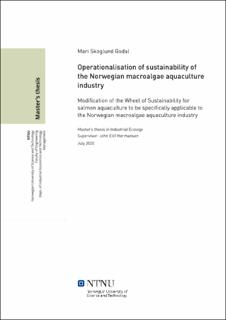| dc.description.abstract | Industrial aquaculture with macroalgae is an emerging industry in the Western world and regarded as an important contribution to increased and sustainable ocean-based biomass production. However, like many other industries, this industry may be associated with various negative aspects with regards to sustainability. Today, there exists no model of sustainability of this industry providing an overview of such important sustainability aspects and potential interconnections and interactions between these. Such a model could be an important tool for understanding, assessment and support of decision-making, in the endeavour to ensure sustainable development of this industry.
This study aimed to identify important sustainability aspects of the Norwegian macroalgae aquaculture industry, and through this, modify the Wheel of Sustainability (WOS), which is a model of sustainability of the salmon aquaculture industry providing a holistic and complexity-based overview of important sustainability aspects of this industry, to make this model be specifically applicable to the Norwegian macroalgae aquaculture industry. The main methods for data collection about important sustainability aspects of the macroalgae aquaculture industry included 15 qualitative semi-structured interviews with relevant actors from science, public administration and the industry, and a systematic literature review. All collected data were analysed and coded according to the original WOS, and used to modify this model to make it be specifically applicable to the Norwegian macroalgae aquaculture industry.
The new, modified version of the original WOS that resulted from this study is named
the Wheel of Sustainability for macroalgae aquaculture (WOS-MA). The results of the study show that all the overarching sustainability aspects from the original WOS, except from one, were found to be relevant also for sustainability of the Norwegian macroalgae aquaculture industry, and thus, they were included in the new WOS-MA. This shows that there are many similarities between these two related industries with regards to sustainability. However, some parts of the model, primarily the parts concerning environmental sustainability, had nevertheless to be modified to make the model be specifically applicable to the macroalgae aquaculture industry. The main reason for this is that macroalgae and salmon are fundamentally different types of organisms which affect their surrounding environment in several fundamentally different ways. Most importantly, this involves that macroalgae aquaculture, as opposed to salmon aquaculture, was found to be able to generate several positive effects on the surrounding environment in addition to potential negative effects. This constitutes a significant difference between these two related industries with regards to sustainability. The results also show that there seems to be a major focus on environmental sustainability aspects among actors within and connected to the Norwegian macroalgae aquaculture industry, while there is a less focus on some other important sustainability aspects, particularly aspects related to the role of companies of the industry as social players in relation to the communities in which they operate. The new WOS-MA, providing a holistic and complexity-based overview of identified important sustainability aspects of the Norwegian macroalgae aquaculture industry, may potentially contribute to a more holistic understanding of sustainability of this industry, and function as a tool for support of strategic decision-making in the endeavour to ensure sustainable development of the industry. However, as the knowledge about many sustainability aspects of the industry currently is relatively limited, and as there are several other aspects that make the results and implications of this study uncertain, there is a great need for more research and work to increase the understanding of sustainability of this industry and to ensure the validity of the WOS-MA. | |
